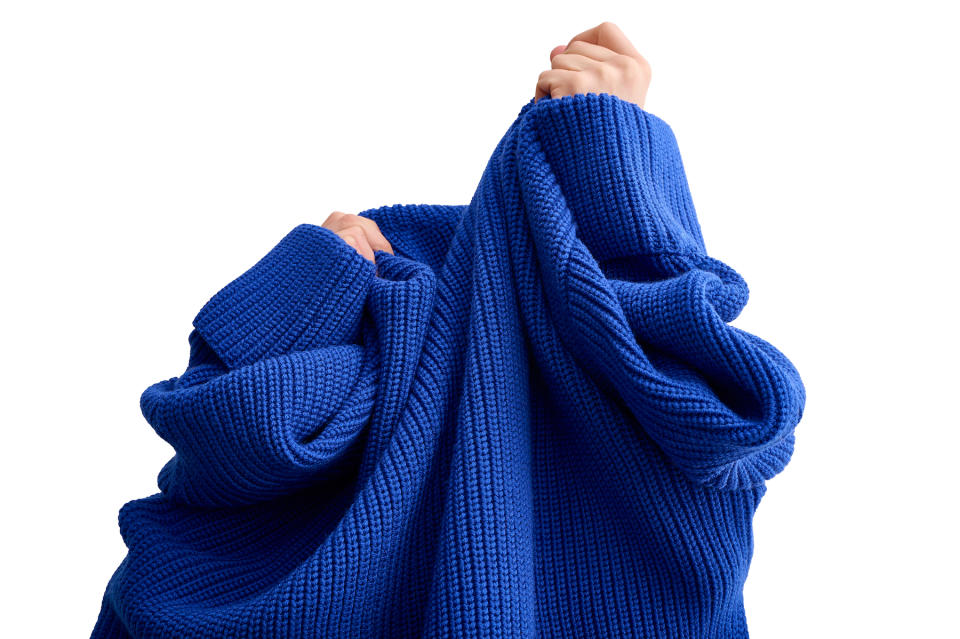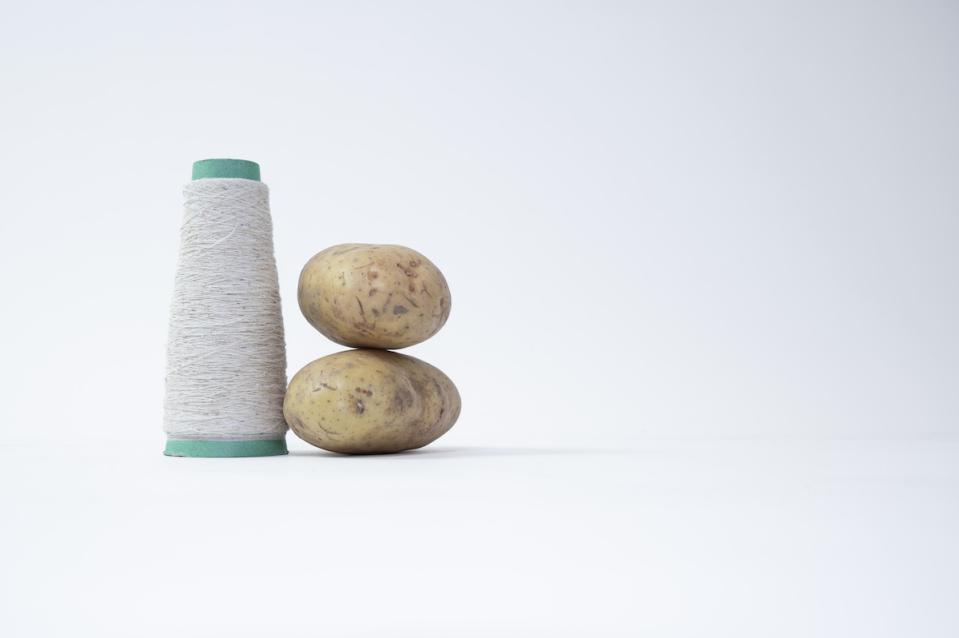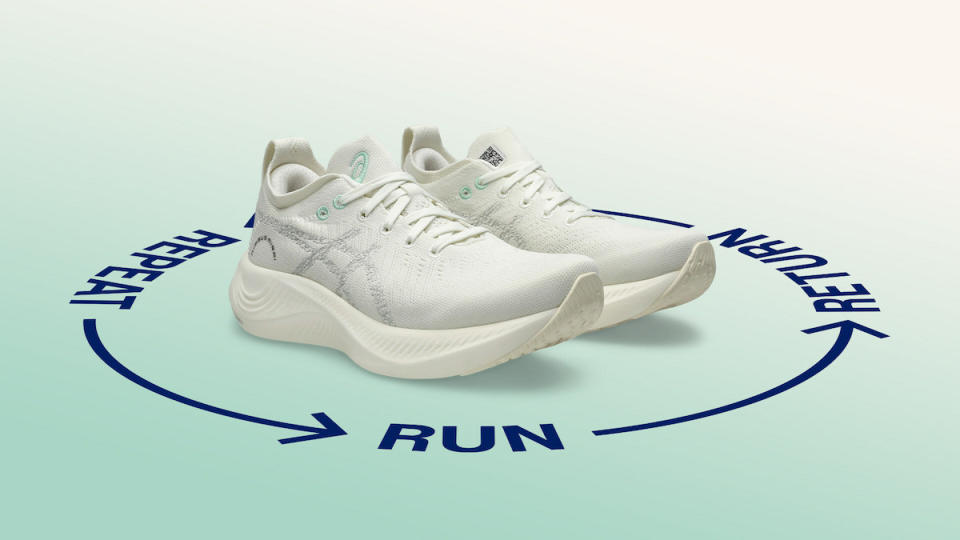Material World: Aware Debuts Acrylic Alternative, Spuds Spun Into Style

Material World is a weekly roundup of innovations and ideas within the materials sector, covering news from emerging biomaterials and alternative leathers to sustainable substitutes and future-proof fibers.
Polyana

From the company behind traceability technology purveyor Aware comes Polylana, a versatile, traceable and 100 percent recyclable fiber. The Amsterdam-based brand announced the launch of an enhanced version of its vegan fiber with the sustainable and recycled content going up from 50 percent to 90 percent.
More from Sourcing Journal
“Polylana was born from the need for a more sustainable alternative to acrylic, a fiber known for its environmental burden. Initially, the only alternatives like rPET fell short in copying acrylic’s appealing qualities such as thickness and softness,” general manager Snowden Shi said. “Driven by innovation, we developed Polylana, a fiber that not only retains the warm softness of acrylic but does so with a significantly reduced environmental footprint.”
Made as an acrylic alternative, Polylana’s bi-component polyester fiber combines the benefits of natural and synthetic wool. Its proprietary extrusion method ensures the fiber that matches the softness and durability of acrylic but does so with a lower environmental footprint; the fiber was “specifically developed” to significantly reduce environmental impact by being acrylonitrile-free and utilizing a production process designed to conserve water.
“Polylana is a drop-in solution that requires no specialized machinery,” Shi said. “It can be processed on standard polyester machinery, making it an easy and efficient substitute for manufacturers looking to transition to more sustainable materials. Polylana is highly scalable and can replace most acrylic and wool products.”
Polylana’s dedicated team in China has been focused on enhancing the recycled content of the fiber, supported by a “significant financial investment” from a leading Chinese textile producer. Polylana has also established a new office in Shanghai to enhance its operational efficiency and responsiveness, ensuring closer collaboration with global brands and their Asian supply chains, the company said.
The upgraded version of its fiber was unveiled last month in China. Polylana wants to demonstrate the benefits of integrating sustainable technologies directly within the textile supply chain in Asia.
“Our team is dedicated to continual innovation, aiming to provide scalable and sustainable material solutions that cater to the evolving needs of the global textile market,” Shi said.
Polylana is currently used by 93 brands and retailers in various products, spanning accessories to sweaters. Notable collaborations include Bestseller, Inditex, Urban Outfitters and Under Armour.
“It’s crucial to understand that Polylana is more than just a fiber; it’s a movement towards a sustainable future in textiles,” Shi said. “Our fiber is fully traceable thanks to our integration of Aware tracer technology combined with blockchain security, ensuring transparency and reliability in our supply chain. As we expand our capabilities and partnerships, Polylana continues to lead the way in sustainable material innovation.”
Fibe

Material science company Fiber has developed the first textile fiber from potato harvest waste. Now, the London-based firm is announcing the completion of its first investment round and a “breakthrough milestone” in creating a yarn from its proprietary fibers.
After being awarded several Innovate UK grants totaling £785,000 (roughly $975,000), Fibe successfully closed its approximately $1.25 million pre-seed investment round. Patagonia’s corporate venture arm, Tin Shed Ventures, led the round, while Alante Capital, PDS Ventures, First Imagine! and several angel investors participated.
With this funding, the startup will focus on scaling up its process so that Fibe has “all the necessary technical and commercial validation” to bring a competitive fiber to market in the coming years, according to co-founder and CEO Idan Gal-Shohet.
“Fibe’s innovation not only avoids emissions from a waste stream with no viable options, but is also poised to produce high quality, lower footprint fibers to help drive the apparel industry’s climate transition,” McKenzie Smith of Tin Shed Ventures said. “We’ve been very impressed with Fibe’s early technical progress and are excited to provide not just investment but also leverage our internal material innovation and commercialization expertise to help accelerate Fibe’s path to market.”
Fibe was founded in 2022 to create the most scalable, affordable and sustainable fibers on the market. It leverages agricultural waste streams, namely potato harvest waste, as the leftover stems and leaves of the potato are the largest untapped agricultural feedstock. The unusable organic material can’t be fed to livestock or turned into fertilizer. As such, 150 million tons of waste are “left to rot” without economic value to the farmer or the circular economy.
Fibe believes its patent-pending technology can use this waste to replace up to 70 percent of the world’s natural fiber demand.
“We are aiming to create an alternative that looks like conventional fibers, feels like conventional fibers and would one day cost the same as these fibers, all with substantial environmental saving and promoting staple food production,” Gal-Shohet said.
The firm aims to compensate farmers for this potato waste and will collect it directly from the farmers, developing a transparent supply chain that can trace each fiber to each farm.
These potato-based fibers have displayed properties akin to those of cotton and polyester. As an indicator of the material’s softness, Fibe said, the fibers have a similar diameter to cotton—outperforming bast fibers like hemp and linen, meaning the company’s fibers can be used for various applications, such as heavy canvas to lightweight shirts. The fiber’s strength is also allegedly on par with standard natural fibers.
And it’s sustainable. By leveraging proprietary fiber extraction technology and waste-stream feedstocks, Fibe said it has created a material with the potential to use 99.7 percent less water, 82 percent fewer carbon emissions and zero land use compared to cotton.
Currently, Fibe is developing a “portfolio of technologies” for more efficient extraction of fibers. Its current patent-pending biological process extracts fibers from agricultural waste without harsh chemicals and is “highly tunable” to a brand’s given needs. Considering scalability and price targets, this technology was designed as an end-to-end automated production line.
“By working with a crop that has never been used for textiles, let alone valorized, we were forced to rethink from the ground up conventional processes,” David Prior Hope, Fibe’s co-founder and CTO, said. “This has pushed us to create a far more efficient system that requires fewer steps and produces higher quality fibers. The benefit of this is this same process can now be used on other fibrous waste streams and even improves hemp and linen extraction.”
TerraCycle

International recycling firm TerraCycle has revealed the recycling process behind Asics’ first closed-loop product: the Nimbus Mirai, a performance running shoe designed to be remade into new Asics at the end of its useful life. TerraCycle’s research and development team created the proprietary recycling process that will enable the Japanese footwear company to debut its first closed-loop design.
“This is an incredible example of collaboration between two major stakeholders in the lifecycle of a product,” said Tom Szaky, founder and CEO of TerraCycle. “Asics is the driving force behind the closed-loop initiative and TerraCycle’s innovative closed-loop recycling process allows athletes and consumers across the world to know their running shoes will be recycled into new shoes and not sent to landfills or incinerators.”
Running shoes are not easily recycled, considering their multifaceted material makeup, consisting of foams, fibers and rubbers that are often glued or stitched together. TerraCycle’s proprietary process allows for the recovery and recycling of the materials used in the Nimbus Mirai.
“The footwear industry has yet to come up with an adequate solution to this waste problem,” said Fumitaka Kamifukumoto, Asics general manager, footwear production division. “We’ve done extensive research, and we’re proud to announce a performance running shoe designed with materials that can be worn and re-worn, ending the single-use lifecycle of our products.”
The closed-loop sneaker is now available in-store and online in select markets. Once the shoes have reached the end of their useful life, consumers are encouraged to return their pair of worn-out Nimbus Mirai to Asics using a free, downloadable shipping label or bring them back to designated retail stores. From there, TerraCycle will recycle the materials into new Nimbus Mirai kicks as well as other products.
Spiber

Japanese biomanufacturing startup Spiber has announced the completion of a fundraising round totaling over 10 billion yen (roughly $65 million). This funding, which includes additional investments from existing shareholders, will allow the company to ramp up the mass production of its Brewed Protein materials and expedite global sales.
“We are grateful for the continued support and confidence from our investors, financial institutions and partner companies who deeply understand the value of our technology platform, development materials and business prospects,” Kazuhide Sekiyama, director and representative executive officer of Spiber, said. “Despite the challenging fundraising environment for startups amidst the global economic landscape, we have been able to sustain our growth thanks to their recognition and expectations. We remain committed to the establishment and enhancement of the biotechnological foundations essential for realizing a circular economy, as well as fulfilling our responsibility for social implementation as a frontrunner in this sector.”
Founded in 2007, Spiber is best known for its Brewed Protein synthetic, material platform of bio-based, biodegradable substitutes for animal-derived inputs like wool, leather, fur and cashmere. Brewed Protein is produced through microbial fermentation, using agricultural feedstocks as the raw material.

